|
|
|
Sort Order |
|
|
|
Items / Page
|
|
|
|
|
|
|
| Srl | Item |
| 1 |
ID:
086244
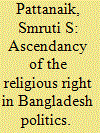

|
|
|
|
|
| Publication |
2009.
|
| Summary/Abstract |
The ascendancy of Jamaat Islami to power in a country that was born on the basis of secularism indicates the changing political dynamics in Bangladesh. Its syncretic tradition rooted in its language and culture limited Jamaat's success. Nevertheless, given the role the party played during the liberation war, its political ascendancy speaks of the changing political landscape. This article argues that though the party has exhibited some political success, it faces challenges from the secularists in the socio-cultural sphere, thereby limiting its growth and expansion.
|
|
|
|
|
|
|
|
|
|
|
|
|
|
|
|
| 2 |
ID:
086225


|
|
|
|
|
| Publication |
2009.
|
| Summary/Abstract |
The realities of climate change are unsettling and define to a great extent the challenges of the twenty-first century. The pressures of living in an age of risk are high with diverse constituencies now involved in the development of climate policy. Policy responses to the prospect of climate change, in particular capping carbon emission, will dominate negotiations and determine the structure of a new regime that is universally ratified and comes into force by 2012.
|
|
|
|
|
|
|
|
|
|
|
|
|
|
|
|
| 3 |
ID:
086246
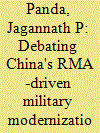

|
|
|
|
|
| Publication |
2009.
|
| Summary/Abstract |
This article intends to examine the notion of 'Revolution in Military Affairs' (RMA) in China and how the People's Liberation Army (zhongguo renmin jiefangjun) is thrusting RMA initiatives on its modernization programme. It sheds light on the issue of China's 'RMA-Driven Military Modernization' programme and situates the effect of these initiatives in the Indian context. However, the core argument of this article is that the term RMA extends beyond the classical military connotation, forming 'Chinese characteristics' - revolving around China's overall socio-political and national objectives. This article would argue that RMA serves as a central linkage between China's evolving thought process on future warfare, overcoming the deficiencies in technological weapons in comparatively primitive branches of the PLA, and as an approach to strengthening China's Comprehensive National Power status.
|
|
|
|
|
|
|
|
|
|
|
|
|
|
|
|
| 4 |
ID:
086230
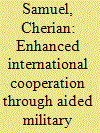

|
|
|
|
|
| Publication |
2009.
|
| Summary/Abstract |
Major powers have tried to use military training programmes, manifested through military-to-military cooperation running the gamut of training exchanges to joint exercises, to defence-related dialogues through seminars and the like, in order to engage and influence other countries in the furtherance of their strategic interests. The US model is notable for being innovative, flexible, scalable, and broad in its approach, and this has fetched it considerable dividends.
|
|
|
|
|
|
|
|
|
|
|
|
|
|
|
|
| 5 |
ID:
086227
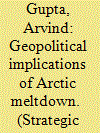

|
|
|
|
|
| Publication |
2009.
|
| Summary/Abstract |
The Arctic Ocean is melting at an alarming pace. In 2005, the extent of summer-time ice in the Arctic was the lowest in the last 50 years, and in 2007, it was 38 per cent lower than the average since 1978. During 1996-2007, summer-time ice in the Arctic declined at an annual rate of 11 per cent. At this rate, the Arctic Ocean may become totally free of ice in summer in a few years, maybe even by 2013. Scientists link the melting of ice in the Arctic Ocean to global warming. The meltdown in the Arctic is dramatic proof of the dire implications of climate change and also an indication of the worsening health of the planet.
|
|
|
|
|
|
|
|
|
|
|
|
|
|
|
|
| 6 |
ID:
086223
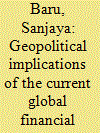

|
|
|
|
|
| Publication |
2009.
|
| Summary/Abstract |
Major economic upheavals do have geopolitical consequences. These are not necessarily enduring or irreversible. The geopolitical implications of a 'big bang' economic phenomenon may unfold over a longer period of time or may be quite dramatic. Much would depend on a complex range of both domestic and external political and social factors. Hence, it would be wrong to rush to any conclusion regarding the geopolitical implications of the current global financial and economic crisis. Further, the past need not always be a guide to the future, given the complexity of change that has already occurred or is underway across different parts of the world.
|
|
|
|
|
|
|
|
|
|
|
|
|
|
|
|
| 7 |
ID:
086229
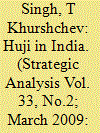

|
|
|
|
|
| Publication |
2009.
|
| Summary/Abstract |
Harkat-ul-Jihadi Islami (HuJI), meaning Movement of Islamic Holy War, has emerged as the largest international Sunni Islamic Jihadi organization created by Pakistan.1 It began to operate in India and Bangladesh in the early 1990s. Earlier it had participated as Mujahideen forces created by the United States and Pakistan to fight against the Soviet occupation in Afghanistan during 1979-1989. Though there is little information about the exact date of establishment of HuJI, its involvement in Afghanistan indicates that perhaps it was founded some time between 1980 and 1985.
|
|
|
|
|
|
|
|
|
|
|
|
|
|
|
|
| 8 |
ID:
086231
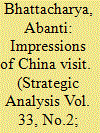

|
|
|
|
|
| Publication |
2009.
|
| Summary/Abstract |
A China team from the Institute for Defence Studies and Analyses (IDSA) had visited Beijing and Shanghai between September 21 and 27, 2008 and held several rounds of dialogue with the five think-tanks of China.1 Three major issues that came up repeatedly during the discussions were: (1) what India's interests are in East Asia; (2) what role the United States has in Asia; and (3) what perception China has towards South Asia in general and Pakistan in particular. In other words, China's broad security concerns seem to emanate from issues of evolving security architecture in Asia, changing dynamics of the US-China relations, and emerging South Asia policy. These concerns are, in fact, tied to the central crux of its foreign policy - that of China's emergence as a world power.
|
|
|
|
|
|
|
|
|
|
|
|
|
|
|
|
| 9 |
ID:
086234
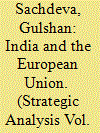

|
|
|
|
|
| Publication |
2009.
|
| Summary/Abstract |
At the ninth EU-India Summit which was held in Marseille in France in September 2008, both partners agreed to a revised Joint Action Plan extending the Strategic Partnership to new areas aimed at promoting peace and comprehensive security, sustainable development, research and technology, and cultural exchanges. The summit also approved a joint work programme on energy, clean development and climate change, a horizontal civil aviation agreement and the launch of a European Business and Technology Centre in India.
|
|
|
|
|
|
|
|
|
|
|
|
|
|
|
|
| 10 |
ID:
086241
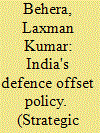

|
|
|
|
|
| Publication |
2009.
|
| Summary/Abstract |
Although India has established a formal mechanism for implementation of the defence offset policy, the structure and procedures lack the thrust to fulfil the objective of energizing the Indian defence industry. Besides, the policy is not supported by the existing Foreign Direct Investment (FDI) and licensing policies. While evidence suggests that domestic industry can absorb offsets, what India needs is an effective body to handle offsets, liberal FDI and licensing policies, and a better banking provision. Also there is a need for a clear roadmap for transfer of technology through offsets, keeping in view India's long-term military industrial objectives.
|
|
|
|
|
|
|
|
|
|
|
|
|
|
|
|
| 11 |
ID:
086236


|
|
|
|
|
| Publication |
2009.
|
| Summary/Abstract |
The root causes for continued turbulence in the Northeast of India can be summed up, inter alia, as the three 'E's - Ethnicity, Economic Development, and Elections. The Northeast has been the recipient of a variety of immigrants each with a distinct ethnic identity. In Assam, a process of assimilation had been going on for a long time with the various groups getting used to the idea of being regarded as part of the Mosaic of Assam, accepting the Assamese Language and opting for a lot of the cultural practices and religious modes. Even the Naga tribes use Assamese as their lingua franca. Unfortunately, however, this process of assimilation and absorption has not only been halted, but is being reversed.
|
|
|
|
|
|
|
|
|
|
|
|
|
|
|
|
| 12 |
ID:
086228
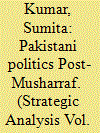

|
|
|
|
|
| Publication |
2009.
|
| Summary/Abstract |
That Asif Ali Zardari would bag the presidency, and with such an overwhelming majority, was a remote possibility back in October 2007, at the time when Benazir Bhutto made her comeback to Pakistan. With a turn of political fortune, a windfall has come Pakistan People's Party's (PPP's) way, occupying as it does two of the three centres of power (troika) in Pakistan. The third member of the 'troika', the army chief, backed in any case the candidature of Zardari, and restoration of democracy which would in turn help restore the credibility of the army.
|
|
|
|
|
|
|
|
|
|
|
|
|
|
|
|
| 13 |
ID:
086239


|
|
|
|
|
| Publication |
2009.
|
| Summary/Abstract |
Nanoscience and Nanotechnology (NT) are emerging fields of science and technology that are witnessing the emergence of an increasing number of new ideas and applications. Many states are seriously looking at military applications of this technology. This paper analyses the impact of NT on defence and looks at its current and futuristic applicability for military purposes, as well as their likely impact on arms control.
|
|
|
|
|
|
|
|
|
|
|
|
|
|
|
|
| 14 |
ID:
086233


|
|
|
|
|
| Publication |
2009.
|
| Summary/Abstract |
Cyberspace, which in common parlance refers to the virtual community space facilitated mainly by the medium of the internet, has been evolving and at a great pace. Today out of the world population of 6.68 billion, about 1.46 billion people1 are connected to the medium, out of which about 46 million are in India where the total population is about 1.2 billion. This is roughly 20 per cent of the global population, while in India the penetration is about just 3.5 per cent. The internet has revolutionized communication and information gathering and has also made possible commerce through the virtual medium, commonly called e-commerce.
|
|
|
|
|
|
|
|
|
|
|
|
|
|
|
|
| 15 |
ID:
086243
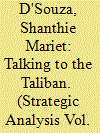

|
|
|
|
|
| Publication |
2009.
|
| Summary/Abstract |
The raging Taliban-led insurgency in Afghanistan underlines the limits of the use of military force. The lack of visible progress on the reconstruction activity and prevailing insecurity has alienated the Afghan populace in the remote villages of South and East Afghanistan. Given that the military option alone has limited utility in Counter-insurgency (COIN), there is a need to exercise an 'out-of-the-box' option to address the present stalemate. After all, effective COIN calls for optimal utilization of military and non-military means and long-term solutions are found in the political domain. In light of the present deteriorating security situation, it would be useful to examine whether exercising the option of negotiations and political reconciliation with the Taliban is a viable COIN strategy in Afghanistan. Will such measures help erode the support base for the Taliban leadership? Importantly, would such steps lead to durable 'peace' in Afghanistan?
|
|
|
|
|
|
|
|
|
|
|
|
|
|
|
|
|
|
|
|
|